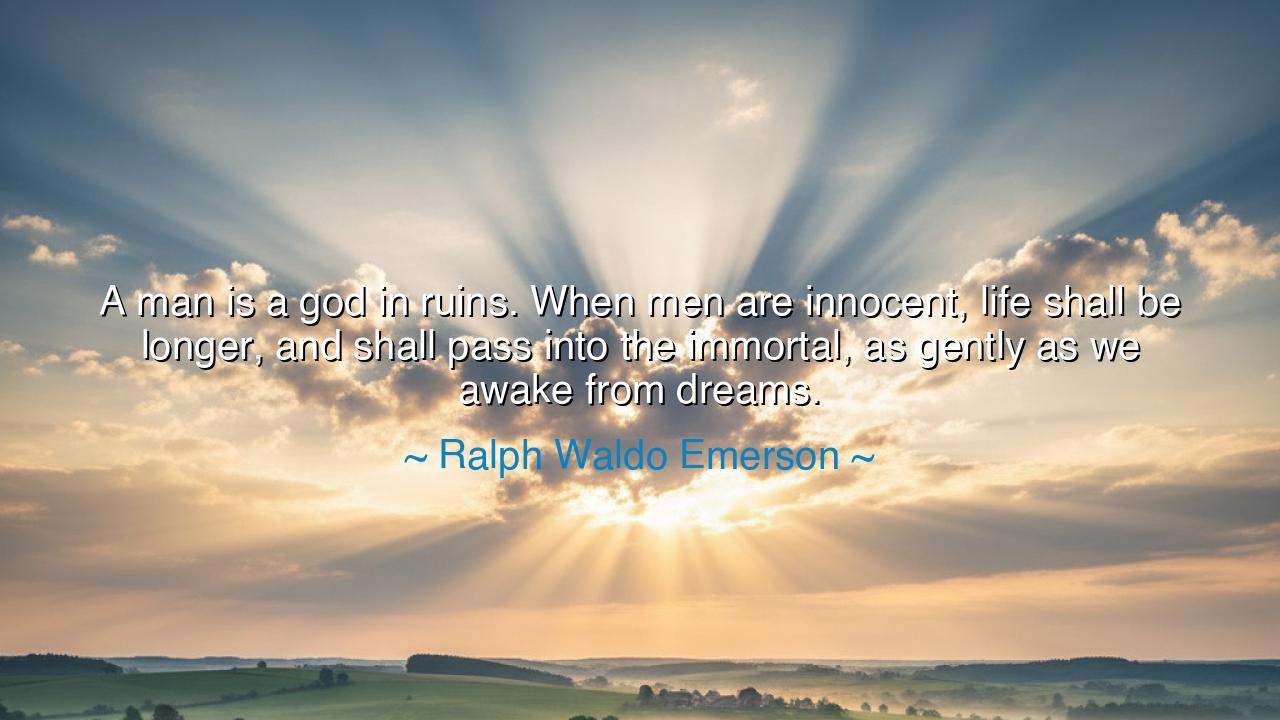
A man is a god in ruins. When men are innocent, life shall be
A man is a god in ruins. When men are innocent, life shall be longer, and shall pass into the immortal, as gently as we awake from dreams.






"A man is a god in ruins. When men are innocent, life shall be longer, and shall pass into the immortal, as gently as we awake from dreams." — Ralph Waldo Emerson
In these words, Ralph Waldo Emerson, the sage of Concord, gazes into the divine essence of humanity. To him, man is a god in ruins — a being once radiant with the fullness of spirit, now dimmed by forgetfulness and sin. Once, we walked in harmony with the eternal; now we wander, half-awake, through the mists of mortality. Yet the ruin is not destruction — it is the remnant of greatness. Even in decay, the temple remembers its shape. Emerson reminds us that the divine spark has not been extinguished, only buried. Within each soul lies the echo of divinity, waiting to rise again into wholeness.
In the ancient sense, this vision is both tragic and hopeful. For man, though fallen, still bears the architecture of the divine. His thoughts, his love, his longing for truth — these are not the cries of dust, but the music of eternity struggling to be heard through the veil of flesh. Emerson speaks as one who remembers that we are not mere creatures bound by time, but spirits exiled into matter, gods who have forgotten their names. The loss of innocence, then, is not only moral but metaphysical — a separation from the source, from the harmony that once made life seamless with immortality.
He says, “When men are innocent, life shall be longer.” Innocence, in the Emersonian sense, is not ignorance, but purity — the clear seeing of the soul that knows its unity with all things. The innocent man lives not against the world but within it, breathing the rhythm of the cosmos. His life flows as naturally as rivers to the sea, unhurried, unafraid. And when death comes, it is no violent rupture, but a gentle awakening — as softly as we awake from dreams. For the one who has remembered his divine nature, death is not an end but a return. The immortal greets the eternal as one greets the morning sun.
Consider, as an image of this truth, the life of Siddhartha Gautama, the Buddha. Born a prince, he lived amidst the splendor of illusion until his heart was stirred by the sight of suffering. Leaving behind all wealth, he journeyed through the wilderness of human sorrow and emerged awakened. In that moment of enlightenment, he rediscovered what Emerson called the innocence of the soul — the oneness of being, the peace that transcends life and death. The Buddha had become again what man was meant to be: a god restored, no longer in ruins, but radiant with compassion and understanding.
Emerson’s insight is not bound to religion, but to the universal law of the spirit. Every age has its prophets who rediscover the god within man. Socrates called it the daimon, the inner voice of truth. Jesus spoke of the kingdom of heaven within. Whitman sang of the divine body and soul as one. All teach the same wisdom: that man’s suffering comes from forgetfulness, from identifying with the ruins rather than the god who dwells within them. The path to redemption, therefore, is remembrance — to recall the glory that was never truly lost.
This teaching holds great power for our time. We live in an age where man worships his machines but forgets his soul. He reaches for the stars yet neglects the light within. To remember that we are gods in ruins is to awaken dignity, compassion, and purpose. It calls us to rebuild the inner temple — not with pride, but with humility; not with conquest, but with understanding. Innocence, in our modern world, is the courage to live with a pure heart amidst the noise, to act with love amidst fear, to create beauty where there is decay.
So let this be your lesson, child of the eternal: You are more than what you seem. Your thoughts are echoes of infinity, your kindness a remnant of the divine. Seek innocence — not naivety, but purity of spirit. Live gently, love fiercely, and walk with reverence through this fleeting dream. For when the soul remembers its divinity, life itself becomes immortal, and death is but the soft opening of the eyes to a brighter dawn.






AAdministratorAdministrator
Welcome, honored guests. Please leave a comment, we will respond soon